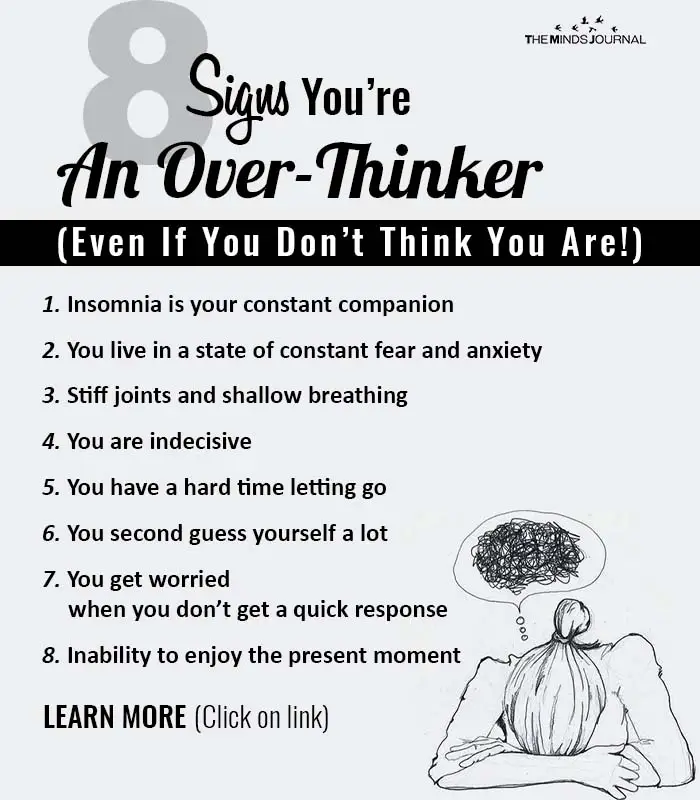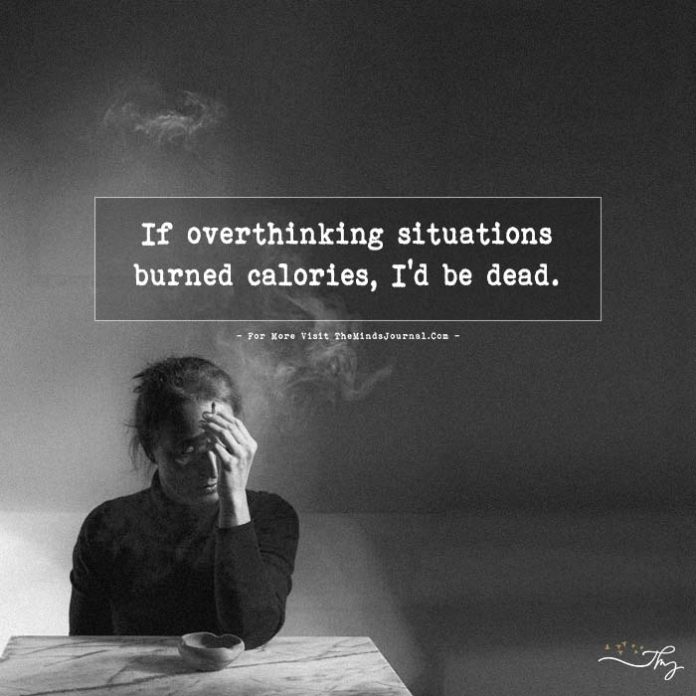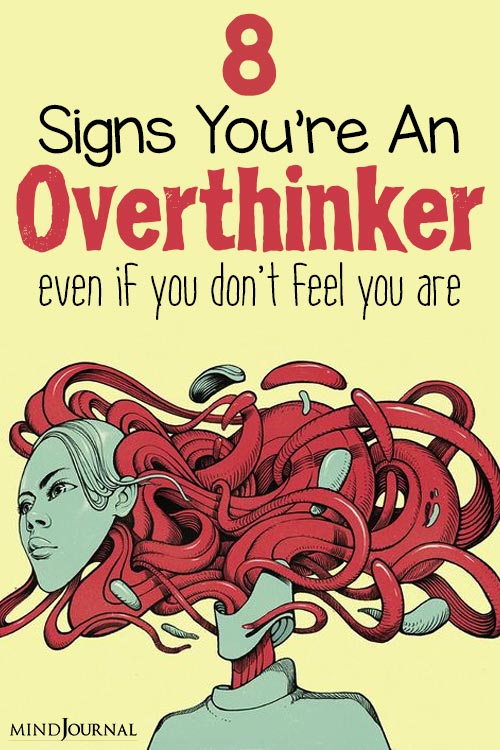Are you someone who constantly obsesses about every minute thing, and then ends up feeling anxious? Congratulations, this is just one of the signs you’re an overthinker!
“The mind is a superb instrument if used rightly. Used wrongly, however it becomes very destructive. To put it more accurately, it is not so much that you use your mind wrongly-you usually don’t use it at all. It uses you.” – Eckhart Tolle -The Power of Now.
Do you feel like you can’t stop the cycle of thoughts in your head and relax even for a minute? Do you find it hard to shut off your brain at any given moment? Are you trapped in an overthinking mind?
Related: Overthinking Mind And Sensitive Hearts: Harsh Truths About An Overthinker With A Sensitive Heart
What Is Overthinking?
Overthinking happens when you constantly obsess and dwell about the same thing, over and over again. You ruminate about it so much, that it ends up getting in the way of your daily, normal life. Being an overthinker means you are either feeling anxious about the future or regretting what happened in the past.
Overthinking is considered to be an unproductive habit, and being a chronic overthinker can lead to a lot of emotional, psychological, and mental consequences. You will find it hard to sleep well, you might struggle with personal and professional relationships and commitments, and overthinking might even end up affecting your career.

What Causes Overthinking?
These are some of the most important causes of overthinking:
- Obsessing about perfectionism, and constantly trying to be perfect
- Stressful situations
- Toxic, dysfunctional, and disturbing childhood experiences
- Need for control
- Genetic factors
- A strong dislike for uncertainty which leads to being in a permanent problem-solving mode
- Having the habit of overgeneralization
- Fear of conflict
- Low self-esteem and low self-confidence
- Anxiety
- Traumatic experiences in the past
The Mind Of An Overthinker
Overthinkers tend to suffer from self-esteem issues, anxiety, self-doubt, and low confidence, which is why they tend to read too much into situations, including even minor and harmless ones. Because of these reasons, you tend to be either stuck in the past or constantly worry about the future, because something stops you from letting go and moving on.
The anxiety you feel puts your brain into overdrive, you start analyzing millions of potential scenarios in your mind, and before you know it, you are drowning in negative and intrusive thoughts. Things like stress, perfectionism, anxiety, and trauma can send your overthinking into an overdrive.
Trauma keeps you stuck in the past and keeps on replaying the painful events over and over again. Stress and anxiety make you worried and scared about the future and what’s to come. And perfectionism feeds on your self-doubt and low confidence and always tells you that you are not good enough or you are not worthy enough or you are not doing enough.
These factors gradually lead to a person turning into a chronic overthinker.
Related: 14 Things Overthinkers Will Understand
8 Signs You’re An Overthinker (Even If You Don’t Think You Are!)

1. Insomnia Is Your Constant Companion.
One of the major signs you’re an overthinker is this. An over-thinker would know the difficulty of insomnia all too well. When you are all by yourself and without any distractions that is the time when your thoughts barrage you with full force.
You get stuck in a cycle of replaying scenarios and reconciling your thoughts until it reaches a point where you feel paralyzed with worry and anxiety.
You should try a few relaxing activities before going to bed like meditation, yoga, coloring, reading, or talking to a loved one. Engage in any activity that gets you out of your head and into the present moment and lightens you up.
2. You Live In A State Of Constant Fear And Anxiety.
Do you play a lot of what-if scenarios in your head? Are you afraid of uncertainty so much that you want to control every damn thing around you? Then you are living too much in the future and overthink a lot.
It is good to have goals and make plans to reach them but it is not possible that everything in life will go according to our plan. Learn to be flexible rather than letting fear paralyze you into inaction.
3. You Suffer From Stiff Joints And Shallow Breathing.
If you are a chronic overthinker and always stressed out, it will show in your body because our minds and bodies are connected.
Excessive worrying causes emotional blockages in our chakras and restricts the flow of prana or vital life force in our body which will show up as fatigue, headaches, stiff joints, and shallow breathing.
Yoga and pranayama are very helpful in clearing out energetic blockages in our bodies. Regular pranayama lowers our breathing and calms down our racy thoughts.
Related: 18 Things That Any Anxious Overthinker Will Understand
4. You Are Indecisive.
This is one of the most defining signs you’re an overthinker. Do you suffer from analysis paralysis? Do you think about all the possible permutations and combinations in so much detail that your brain gets tired of reanalyzing everything and you ultimately end up doing nothing?
Learn to include your gut instinct in decision making, take action, learn on the fly, and course-correct on your way.
5. You Have A Hard Time Letting Go.
Do you keep ruminating over what someone said to you or why someone hurt you? Do you replay scenarios in your head thinking you might be able to extract one more important piece of information if you rethink it one more time?
If this rings a bell, then you are making your presentation more difficult due to what happened in the past. Take the lesson from what happened and let the other stuff go.

6. You Second Guess Yourself A Lot.
Another one of the classic signs you’re an overthinker. People who overthink, live a lot in their heads and therefore they are out of touch with their intuition or inner voice. They seek outside opinions and validation before taking any decision.
Try to take out some time to spend with yourself in solitude whether in meditation or other activities where you can quiet your incessant thinking and let your inner wisdom guide you.
Related: 11 Ways To Put An End To Overthinking
7. You Get Worried When You Don’t Get A Quick Response.
For an over-thinker, not getting a quick response is the worst nightmare. As soon as you send a text or mail, you take stock of the time the other person takes to respond. And if it is long, you start thinking about the worst-case scenarios. You think you might have said something wrong or wonder if the person is ignoring you.
Take a few deep breaths and calm down.
And when you are settled, try to think objectively that the other person might be really busy or caught up to respond instead of believing in all the worst-case scenarios.
8. You Find It Hard To Enjoy The Present Moment.
It is a clear sign you are thinking too much in your head if people around, cannot connect with you emotionally. If you can’t leave the baggage of your thoughts ever and enjoy the simple pleasures of life like watching a sunset or smelling the roses then you are more caught up in your head.
Try to live in the moment and open your heart to the wonder that the world around you has to offer. Entertain those thoughts that serve your highest good and let go of the ones that drain you.
Related: Struggles Of An Overthinker: 18 Things Only They Understand
How To Not Be An Overthinker?
If you are thinking about how to deal with overthinking, then these strategies and tips might help you a great deal:
- Try to identify your triggers and destructive thought patterns.
- Take a deep breath and think about how you are reacting and responding.
- Move on from the past and make your peace with it.
- Focus on the present and enjoy it.
- Distract yourself whenever you feel like your overthinking is starting to control you.
- Meditate every day for at least 15-20 minutes.
- Identify your Automatic Negative Thoughts (ANTs), i.e., your instinctive negative reactions to certain situations.
- Try to think about everything in a practical way and focus on solutions.
- Cultivate self-compassion.
- Understand the difference between intuition and fear.
- Acknowledge the positive things in your life, and try to be grateful for them.
- Try to look at the grand scheme of things, and cultivate a “bigger picture” thinking.
How To Deal With An Overthinker?
1. Make sure you always communicate with them properly.
You don’t have to give them every little detail of your life and activities but do communicate with them as openly as possible. Healthy communication is the foundation for a strong relationship, especially when your partner is an overthinker.
Having clear, transparent conversations with each other can go a long way in helping them cope with their overthinking.
2. Try not to say things you don’t really mean.
Never ever say things you don’t mean to an overthinker because if you are joking about something, they will end up taking it very seriously.
Overthinkers have a tendency to read too much into everything, and before you know it, they are constantly obsessing about it. So, don’t say stuff you don’t mean or just make it very clear that you were kidding, and most importantly, let them know that.

3. Reassure them at times.
The occasional reassurance doesn’t hurt, you know. Letting them know that you love them and will always be there for them makes them feel safe, assured, and calm.
I am not saying mollycoddle them all the time, but expressing your feelings for them sometimes can really help them and your relationship.
Related: 9 Things You Need To Know Before Dating An Overthinker
4. Don’t constantly tell them to stop overthinking.
Just because you are telling them not to overthink, that doesn’t mean they will just stop doing it all of a sudden. Also, by saying this, you are undermining their struggles and dismissing their feelings.
You shouldn’t just try to avoid any conversation by asking them to simply ‘stop’; rather try to understand where they are coming from, and help them deal with it in a healthy way.
Being an overthinker is hard, and dealing with your hyperactive and anxious brain can really take a toll on you. How many of these signs could you relate to? Let us know your thoughts in the comments down below!
Want to know more about the traits of an overthinker? Check this video out below!












Leave a Reply
You must be logged in to post a comment.